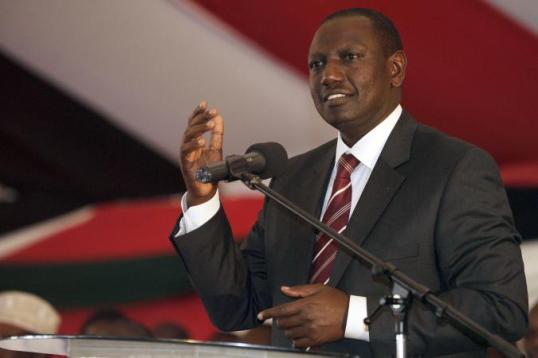 Members of the ethnic Kikuyu community, to which Uhuru belongs, know that without a Kikuyu-Kalenjin alliance, the fate of Kikuyus in the Kalenjin-dominated Rift Valley is at stake.
Members of the ethnic Kikuyu community, to which Uhuru belongs, know that without a Kikuyu-Kalenjin alliance, the fate of Kikuyus in the Kalenjin-dominated Rift Valley is at stake.
Memories of the post-election violence in 2007/2008 that targeted Kikuyus in the Rift Valley still haunt them. The union of Ruto and Uhuru prior to the 2013 elections was motivated not just by the fact that both politicians faced crimes against humanity charges at the International Criminal Court, but that they belonged to communities that have been at war since the 1990s, when President Daniel arap Moi, a Kalenjin, orchestrated ethnic clashes between the Kikuyu and the Kalenjin.
“The Kikuyu people were both shocked and relieved with the handshake. Shocked because the Kikuyu who have over time become politically intolerant of any opposition to their Uhuru Kenyatta and in essence to any force opposed to Kikuyu political dominance, did not anticipate him patching up with Raila, a man Uhuru had fought tooth and nail to retain the presidency – at whatever cost,” said a Central Kenya politician who is well acquainted with both President Uhuru and Raila.
“Already torn between throwing their support behind Deputy President William Ruto and finding their own [Kikuyu] successor to President Uhuru, the Kikuyus are at a crossroads politically. With an exiting President Uhuru, who constitutionally cannot run for another term, and with a presumed ‘political debt’ hanging over them that they owe Ruto, the Kikuyus are faced with unprecedented political uncertainty for the first time,” said the politician, who served in President Mwai Kibaki and Prime Minister Raila Odinga’s coalition government between 2008 and 2012.
“Uppermost in their minds, is how they will secure their political insurance once President Uhuru is gone. Split between settling a debt (grudgingly and however painful it is) and charting their own political path – meaning finding a Kikuyu politician to back for the presidency come 2022 – the Kikuyus will welcome any political move that will free them from their anxieties and from skipping a debt that was painfully imposed on them.
” Groups of Kikuyu men and women in Kiambu and Kikuyu towns in Kiambu County were categorical that the handshake did not now mean “that we [Kikuyus] can hand over the reins of power to Raila,” and by extension, to the Luos.”
They reminded me of the prophesies of Mugo wa Kibiro, a great Kikuyu seer, some of which are related in Jomo Kenyatta’s anthropological treatise, Facing Mt Kenya. “Ruriri rwa Gikuyu ni rukanyarirwo in karuriri kanini kwa ihida, no nimagacokerio utongoria wa bururi”.
In essence, they were saying that Mugo had prophesied that the Kikuyu would be dominated by a small tribe for a while.
In their chauvinistic interpretation of the seer’s vision, that “small tribe” referred to the Tugen, former President Moi’s ethnic community.
But after that, the Kikuyu would retake the leadership of the country and would not again cede it. “Does it mean now we are friends with the Luos?” asked a middle-aged Kikuyu businessman.
“It is really already too late for anyone to tell us to vote for a Luo. Raila’s name is too besmirched politically among the Kikuyus for them to even contemplate voting for him.
The Kikuyu people cannot trust him. This position has been entrenched by Uhuru Kenyatta himself who told us that if Raila assumes the presidency, he will come for us.” The businessman said the handshake had introduced a new variable, but he was still convinced that many Kikuyus would rather vote for Ruto in the absence of not having one of their own candidates.
“With an exiting President Uhuru, who constitutionally cannot run for another term, and with a presumed ‘political debt’ hanging over them that they owe Ruto, the Kikuyus are faced with unprecedented political uncertainty for the first time,” said the politician.
Following the second presidential election of October 26, 2017, among the most economically hard-hit Kenyans were the Kikuyus.
Their businesses have hit rock bottom and a majority of their youth are jobless and remain unemployed – a trend that even the political elites are concerned about.
A friend who is a stockbroker and who works for a securities firm surprised me when he told me that his firm had to move from their posh offices in downtown Nairobi because business was really bad.
Many Kikuyus have invested in stocks and bonds; some of them have been trading for the last 50 years. Between August 2017 and March 2018, a mzee from Murang’a, who has been trading in shares since 1966, told me times had never been so bad and hard.
He claimed to have lost millions of shillings in six months.” On the day of the Uhuru-Raila handshake, the shilling appreciated against the dollar, suggesting that the market was responsive to the political détente.